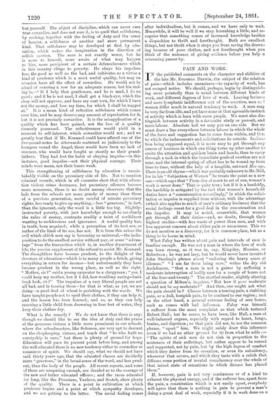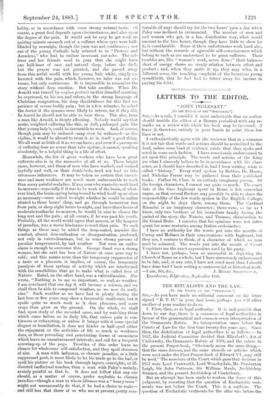PAIN AND WORK.
TN the published comments on the character and abilities of the late Mr. Erasmus Darwin, the subject of the relation of pain—which includes uneasiness—to capacity of work, has not escaped notice. • We should, perhaps, begin by distinguish- ing more pointedly than is usual between different kinds of work, and different degrees of love of work. Leaving laziness. and mere lymphatic indifference out of the question, men an 3 women differ much in natural tendency to work. A man may be very far from idle, and yet have none of that agreeable instinct. of activity which is born with some people. We must also dis- tinguish between activity in a favourite study or pursuit, and mere labour. Absolute toil we may put on one side. But we must draw a line everywhere between labour in which the whole of the force and suggestion has to come from within, and that to which the inducements and solicitations lie outside. Inclina- tion being supposed equal, it is more easy to get through any- course of business in which one thing turns up after another to excite the attention and quicken brain and hands, than to carry through a task in which the immediate goals of exertion are not near, and the internal spring of effort has to be wound up from time to time, without the help of a tangible, outward Hoc age.. There is an old rhyme—which was probably unknown to Mr. Mill, for in his "Subjection of Women" he treats the point as a new one—which says that " From rise of morn to set of sun, woman's. work is never done." That is quite true ; but if it is a hardship,. the hardship is mitigated by the fact that woman's household duties have a "concatenation accordingly," in which the solici- tation or impulse is supplied from without, with the advantage- (which also applies to much of men's ordinary business) that the social feelings count for a good deal in the concatenation and the impulse. It may be noted, meanwhile, that women get through all their duties—and, no doubt, through their- highest studies—with less waste of power than men, and with less apparent concern about either pain or uneasiness. This we do not mention as a discovery, for it is common-place, but as a thing to be borne in mind.
'What Paley has written about pain and intervals of ease is. familiarenough. He was not a man in whom the love of work. was born strong, as it was in, say, Kingsley, Maurice, or Robertson ; he was not lazy, but he would never have invented John Sterling's phrase about "enduring the heavy cross of idleness." "I am far from being sure," writes the dry old Archdeacon, "that a man is not a gainer by suffering a moderate interruption of bodily ease for a couple of hours out of the four-and-twenty." The startled reader, slightly altering a question of Milton's, inquires, " But how if your moderate should not be may moderate ?" And then, one might ask what the pain should be ? Choose between a tearing pain, a stabbing pain, or a dull, lumpish pain, to be confined to one region ; and, on the other hand, a general extreme feeling of sore bones,. such as comes with bad influenza. Paley was himself. a sufferer from the same complaint as that which tortured Robert Hall ; but he seems_ to have been, like Hall, a man of well-balanced organs, especially with regard to heart, lungs,. brains, and digestion ; so that pain did not, to use the common phrase, " upset " him. We might safely draw this inference: (even if we had no other ground for it) from what he adds :— "The spirits of sick men do not sink in proportion to the acuteness of their sufferings, but rather appear to be roused and supported, not by pain, but by the high degree of comfort which they derive from its cessation, or even its subsidency,. whenever that occurs, and which they taste with a relish that diffuses some portion of mental complacency over the whole of that mixed state of sensations in which disease has placed them."
If, however, pain is not very continuous or of a kind to' exhaust the physical energy, and if the sufferer has, apart from' the pain, a constitution which is not easily upset, everybody will agree that there is nothing in pain to prevent a man's doing a great deal of work, especially if it is work done on re.
hobby, or in accordance with some strong natural taste. Of course, a great deal depends upon circumstances, and also upon the degree of the pain. It would not be easy to get work re- quiring minute research out of a sufferer whose eyes were half- blinded by neuralgia, though the pain was not continuous ; nor out of the young Catholic lady referred to in " Proteus and Amadeus," who had to endure incessant ear-ache. The suf- ferer and her friends used to pray that she might have one half-hour of ease and natural sleep, before she died; but the prayer was not granted, and she passed away from this awful world with her young hair white, simply ex- hausted with the pain, which, however, we infer was not ex- treme, but only continuous. It is impossible to remember the story without deep emotion. But take another. When Dr. Arnold was roused by angina pectoris on that dreadful morning, he expressed, to his son and others, in the strong language of Christian resignation, his deep thankfulness for this first ex- perience of severe bodily pain ; but in a few minutes, he asked the doctor if the spasms were likely to return, for if they did, he feared he should not be able to bear them. This also, from a man like Arnold, is deeply affecting. Nobody would say that acute, weighted suffering like this, or dull, prolonged pain like that young lady's, could be favourable to work. And, of course, though pain may be endured—may even be welcomed—as dis- cipline, it would be absurd to treat it as in itself a good thing. We all want as little of it as we can have ; and even if a paroxysm of suffering does no worse than take up time, it cannot, speaking absolutely, be a helpful thing in a life of effort.
Meanwhile, the list of great workers who have been great sufferers also is in the memories of all of us. These bright cases, however, and those of men who have worked, and worked joyfully and well, on their death-beds, need not lead us into erroneous inferences. It may be taken as certain that uneasi- ness and mere weakness are much more unfavourable to work than many painful maladies. If any manwho wanteato work hard to-morrow—especially if it was to be work of the brain, of what- ever kind, the brain-spring being bound to wind itself up as often as necessary—were asked to-night whether he would be rather stinted to three hours' sleep, and go through to-morrow free from pain, or sleep eight hours to-night, and have three hours of moderate toothache to-morrow, he would be wise to choose the long rest and the pain ; at all events, if he was past his youth. Probably, all the world would agree that nausea, or the languor of jaundice, was a worse hindrance to work than pain. To such things as these may be added the deep-seated, massive dis- comfort, almost demoralisation or disorganisation, produced, not only in valetudinarians, but in some strong persons of peculiar temperament, by bad weather. Not even an enthu- siasm is enough to overcome this. George Sand was a strong woman, but she said her love of Nature at once gave way to cold; and this means more than the temporary suppression of a taste or a pleasure, it implies, of course, the temporary paralysis of those springs of activity which are intertwined with the sensibilities that go to make what is called love of Nature. Rahel, on the other hand, was a valetudinarian. She wrote, "Nothing is to me so important, so real, as weather. I am convinced that one day it will become a science, and we shall then be able to compound weather, as we now do medi- cine." Such weather as we have had in plenty during the last four or five years may show a favourable death-rate, but it spoils quite as much work as it does pleasure, and more crops than grow on the ground. On the whole, we shall find, upon study of the recorded cases, and by watching those which come before us in daily life, that unless pain is con- tinuous or exhausting, or unless it brings with it some special disgust or humiliation, it does not hinder or half-spoil either the enjoyment or the activities of life so much as weakness does, or those pervading and penetrating forms of uneasiness which leave no unembarrassed intervals, and call for a frequent screwing-up of the pegs. Troubles of this order leave no chance for wholesome self-satisfaction, and they spoil closeness of aim. A man with influenza, or chronic jaundice, or a little suppressed gout, is more likely to let his trade go to the bad, or spoil his picture or his book through lapses, oversights, or ill- -directed ineffectual touches, than a man with Paley's malady, acutely painful as that is. It does not follow that any one should, as a matter of course, prefer nephritis to chronic jaundice—though a man to whom idleness was a 'heavy cross" might not unreasonably do that, if he had a choice to make- . and still less that those of us who are at present pretty corn-
fortable (if any) should try for the two hours' pain a day which Paley was inclined to recommend. The number of men and and women who get, in a lax, distributive way, what would amount to the two hours, though they have little to show for it, is considerable. Some of these unfortunates work hard also, but without the rewards of agreeable self-consciousness which belong to such as are understood to be great sufferers. Their troubles are, like "woman's work, never done ;" their balance- sheet of energy shows no steady relation between effort and product ; and, when they make it up, they may echo, in a different sense, the touching complaint of the luxurious young spendthrift, that he had had to fritter away his income in paying his debts.































 Previous page
Previous page